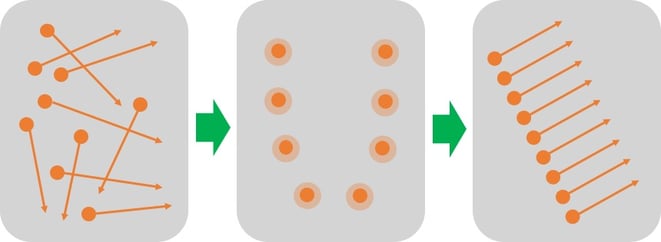
I’ve never been lucky enough to have a true calling to guide my life choices, but if I had to name one thing that drives me, it would be helping other people. I love being able to make things easier for others. Therefore, it’s only natural I got into facilitation.
“No pain, no gain” is something we hear all the time and, true enough, you do usually have to put in some effort to get great results. Still, the effort itself is not the goal, and if there’s a way for us to ease the way, there’s no reason we shouldn’t take it. On the contrary, if we are ready to accept help, we can reserve our time and energy into more pressing matters.
And this is what facilitation is all about, making the situation more manageable.
“Facilitate” is a word that stems from Latin. In English, facilitare means making something easier, to simplify. Facilitation refers to specific methods and viewpoints that guide decision-making and help people commit to shared conclusions. During these digital times and the sudden rise of video calls, the art of good facilitation has proven to be more valuable than ever.
Facilitation offers an opportunity to listen – and to be heard
It goes without saying, that within a group of people there are always different views and opinions. And sometimes we find ourselves in a situation where we would need to get that group of people to agree on a topic, or at least hear each other out. This is where facilitation comes in handy. It helps bring out different opinions and ideas, and to align them towards a common goal.

In a well-facilitated event, whether it’s a meeting or a workshop, participants end up genuinely listening to other people. They will also get the experience of being heard themselves. As a result, they will evaluate the other’s thoughts in relation to their own, making it possible to adopt new ideas, to actively seek change and to find common ground.
The goal is to involve all members of the group in the idea-generating and decision-making processes. When the entire team is involved, also individual participants will feel more committed to the outcome. After all, they did work hard together to achieve it!
And indeed, it’s the outcome that matters. A common mistake organizations make is to organize a facilitated session just to give the impression of listening. However, it’s all meaningless if the purpose is not to implement those shared decisions, goals, and learnings.
That is why workshops should only include relevant people with the possibility of making an actual impact. Also, if decisions have already been made regarding the topic at hand, there’s not much reason to facilitate a workshop at all.
As a communications consultant, it’s my job to help our customers in various challenging situations. We might ponder together on what sort of communicational tools would work best in reaching certain strategic goals, or we might work together to identify the kind of content that works best for chosen target audiences.
A facilitated workshop is a great way to brainstorm, bounce around ideas and determine the best possible actions. Let us know which challenges you are facing right now. After all, Netprofile exists to facilitate your work, to make your life easier!
Photo: Kelly Sikkema on Unsplash
